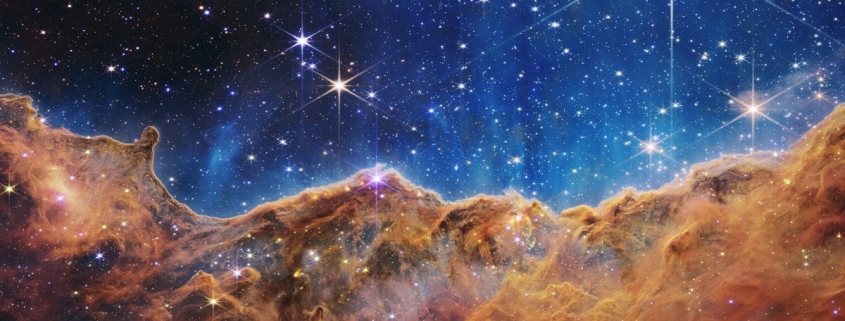Why you don’t need to play a drinking game to understand the wonder of the James Webb Space Telescope’s first images
This article originally appeared on July 18, 2022 at Baptist News Global.
A moment more than 13 billion years in the making happened last Tuesday as the James Webb Space Telescope revealed its first five images to the world.
Hailed by NASA as “the dawn of a new era in astronomy,” the images revealed a deep field of galaxies never before seen, an exoplanet containing water in its atmosphere, gas and dust clouds being ejected from two dying stars, the dance of five galaxies and the shockwaves sent out as one of the galaxies collides through, and the radiation and winds caused by the birth of new stars.

The Webb Space Telescope on display before launch. (Photo courtesy of NASA)
According to the livestream from NASA’s Goddard Space Flight Center in Greenbelt, Md., three questions NASA seeks to explore through Webb are:
- How did the first galaxies form and evolve?
- Are there chemical signatures of the building blocks of life on other worlds?
- Is our solar system unique?
Of course, questions and new discoveries about space always lead to people wondering about human identity in light of what we learn. And as our discoveries grow, Christians tend to wonder about the implications such discoveries might have for theology.
I recently interviewed Paul Wallace, an astrophysicist and Baptist pastor, to better understand the importance of these new space discoveries. But to appreciate what he has to say, first we need to consider how other Christians responded to last week’s stunning space images.
Young earth creationists respond
Christians who are young earth creationists take a literalist reading of Genesis 1, combined with adding up the genealogies listed in the Bible to assume the entire universe is about 6,000 years old. While expressing interest to a degree in NASA’s new findings, they ultimately are skeptical of the James Webb Space Telescope project.

Danny Faulkner
Answers in Genesis, one of the leading purveyors of young earth theology, broadcasted a livestream of their reaction to the NASA images. That Facebook session was hosted by two of their staff members, astronomer Danny Faulkner and “Rocket Rob” Webb, an aerospace engineer.
Although clearly impressed with the technology, neither Faulkner nor Webb were buying the science. Faulkner admitted, “If light travels and always has traveled at a constant rate, then it does seem to present a problem.”
Instead of accepting that scientific fact first articulated in 1850, though, Faulkner suggested another option: “Not only did God miraculously make the heavenly bodies on day four, but he rapidly brought the light to the earth. … We think we’re seeing these things something close to real time. … We don’t really have a well-developed creation model of cosmology. … We just need a paradigm to interpret those things.”
Faulkner, who holds a Ph.D. in astronomy from Indiana University, also questioned whether new stars are still being born, because that would imply an ongoing creation.
“A lot of creationists think not, because God created stars on day four and he stopped creating,” Faulkner explained. “You know he also made horses and dogs on day six, but yet there are horses and dogs being born today. So they’re replacing, I guess, the horses and dogs as they die off. They’re multiplying and they’re being fruitful. Stars are never said to do that, but we do sometimes talk about stars dying. And they will wear out. So is God providing for new stars today? I don’t know.”

“Rocket Rob” Webb
Webb, who previously worked for NASA in satellite navigation, expressed even more opposition to the science behind the images from the Webb telescope. Rather than believing the speed of light never changes, he said the Bible never changes.
“We make sure we’re always looking at the evidence with a biblical worldview, starting with the solid rock, which is God’s word that never changes. Of course, that is always consistent because our God never changes, rather than putting our beliefs and our systems onto the shifting sands of man’s opinion. … We’re a biblical authority ministry. … We’re all about the gospel. We’re all about proclaiming the good news of Jesus Christ and what he did for us guilty sinners.”
Rocket Rob Webb — who has no relation to the name of the telescope — made sure to get out ahead of the Webb telescope launch in January with a “Biblical Response to the JWST Launch” column. There, he said, “Instead of submitting to God, they have turned to the religion of materialistic atheism (and secular humanism) to answer the fundamental questions posed by the JWST program, thus further reducing themselves to absurdity and foolishness.”
As the Answers in Genesis livestream continued, Faulkner played a drinking game where he’d take a sip of Cheerwine every time a NASA scientist mentioned “billions of years” — a meaningless phrase to anyone who believes the earth is only 6,000 years old.










Leave a Reply
Want to join the discussion?Feel free to contribute!